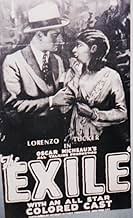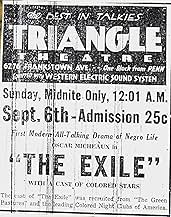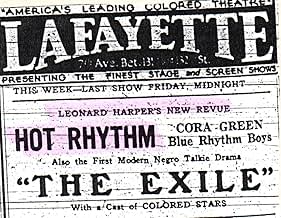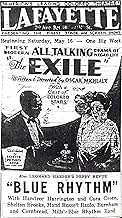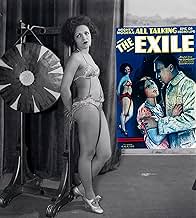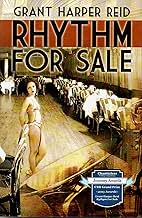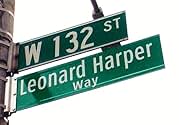Adicionar um enredo no seu idiomaA young man named Jean in post-World War I Chicago falls in love with a beautiful girl named Edith. He proposes to her, but realizes that she's involved in the rackets and won't leave them, ... Ler tudoA young man named Jean in post-World War I Chicago falls in love with a beautiful girl named Edith. He proposes to her, but realizes that she's involved in the rackets and won't leave them, so he goes back home to South Dakota, where he becomes a successful rancher. There he fall... Ler tudoA young man named Jean in post-World War I Chicago falls in love with a beautiful girl named Edith. He proposes to her, but realizes that she's involved in the rackets and won't leave them, so he goes back home to South Dakota, where he becomes a successful rancher. There he falls for a white girl, but guilt drives him back to Chicago, where he runs into Edith again, ... Ler tudo
- Jack Stewart
- (as Charles Moore)
- An Outlaw
- (as A. B. Comathiere)
Avaliações em destaque
The entertainment in the movie is wonderful, Micheaux didn't go wrong there, he always included good entertainment, you can't leave out black entertainers in a time when black entertainers were said to be the best. He knew if people didn't like the movie, they'll like the entertainment, which is true to this day. Black Cinema in those days made sure to include great music and entertainment. Leonard Harper, a man who helped many great black talents become successes, he was highly respected in his time in show business, he was like a Ziegfield and Busby Berkeley, he lends his expertise to Micheaux, we get to see his beauty chorus, tap dancers and Louise Cook, a popular dancer in the 30's who was married to one of the Mills Brothers. Donald Heywood's band is great as always, he had a helping hand in many Black Cinema films of the early years.
This movie is based on Micheaux's semi-autobiographical novel, as was, by appearances, his lost first movie, THE HOMESTEADER (1919). This sound version is an awkward combination of intermittently poor soundtrack, important philosophical discussions, stilted dialogue spoken badly, and excellent variety numbers -- Roland Holder's tap number is very well done, and the cinematographers move the camera during the hot chorus number.
It's impossible to overstate the importance of Micheaux in film-making, as the first black producer-director-writer to turn out movies regularly. He turned out 39 of them from 1919 through 1948, and he tackled serious issues that other Black film makers ignored. However, he wrote dialogue poorly, and directed that dialogue badly. The reason for the problems are obvious: lack of money. Particularly when you got into sound films, making a movie cost a lot of money, not just for sound equipment, but in rehearsal time for actors to learn their dialogue and perform it well. Even well-funded major studios were barely done learning these lessons by the time Micheaux began to study them with this one. An unmoving camera and cramped set weigh down the dialogue segments. The result is a movie that anyone interested in the history and evolution of film needs to look at, but will have to admit is not very good.
An oddly constructed plot, dreadfully poor audio, and dialogue heavy scenes make watching Oscar Micheaux's first foray into talkies a bit tough. On the other hand, the story held my interest and was easy to follow, and as it was based on Micheaux's autobiographical novel The Conquest, it carried with it aspects that were deeply personal to him. His leading lady, Eunice Brooks, turns in a good performance portraying a femme fatale who is lovestruck by one man (Stanley Morrell), and rather cruel to another (Carl Mahon). As with many of his other films, Micheaux livens things up with musical performances. Check out Roland Holder's nifty tap dance at 49:15, and the wild chorus girl dance to "Make Hay Hay While the Sun is Shining" at 57:20.
Unfortunately, it was often hard to hear the words while watching this, despite my TV being cranked up to maximum volume. Let's just say, I hope that someday someone puts the audio through noise filtering or the "AI" treatment that lost Beatles track just got. It starts with a man leaving his fiancée because she intends to turn the mansion of her former white employer into a speakeasy and casino. He doesn't drink or gamble and wants to move out west to become a rancher, something that doesn't appeal to her. There is an aspect of "good" man contrasted with "bad" woman here that could have done with more nuance, but I think Micheaux was appealing to virtue and work ethic as the way into the middle class for African Americans, a common theme for him.
While in Montana for five years, the man strikes up a relationship with another woman (Nora Newsome) but leaves her because he fears they can't be together. She's white, you see, and he feels this way despite her wonderful comment that "race doesn't matter" and a long kiss they share, something which must have caused eyebrows to raise at local censorship boards. I loved this boldness from Micheaux, even if after the man's gone, her father rather conveniently tells her that her mother was Ethiopian, which also allows us to guess where this going to go.
Meanwhile back in Chicago, the woman has become the "queen of the underworld," and of questionable virtue. We eventually hear that she's led an immigrant from Ethiopia on, and corrupted him with her wicked ways (as an aside, clearly the coronation of Haile Selassie in Ethiopia the year before was on Micheaux's mind). I wish we had seen all this, instead of hearing about it in the dialogue. In general, I wish the action had stayed on Brooks's character as she was more interesting. The two men had some degree of screen presence, but lesser acting ability, and not a lot of chemistry with her. Anyway, it all comes to a head when a gun is drawn, hearkening back to the old white owner of the mansion's violence we're told about at the beginning, but I won't spoil it further.
It's fascinating to think that this film was based on Micheaux's novel, and that he established and farmed on a homestead in South Dakota from 1904 to 1911. His marriage out there was deeply unhappy and short-lived, something he altered in the fantasy of his story. His homestead failing led him to write books, which in turn led him to make movies, so there is both the snippet of an origin story and imagined dream ending here. It's creaky and will take patience, but it's worth seeing.
** (out of 4)
Jean Baptiste (Stanley Morrell), a black man from Chicago, could live a good life if he agrees to marry Edith Duval (Eunice Brooks) who has just came into possession of a mansion, which she plans to turn into a speak easy. Instead Jean decides to move out West to start a farm and it's there that he meets a white woman (Nora Newsome) and falls in love. However, he feels guilty that she's white and he returns to Chicago and sure enough runs into Edith.
THE EXILE is a historically important film since it was the first black film to be an all talking picture. That reason alone means it's very important but sadly the film itself really isn't all that good. As with many of the early Hollywood talkies, this film here has one major issue and that's the fact that it just doesn't know when to shut up. This film has so much pointless dialogue that you can't help but wish the film was a silent so that people would just shut up.
The dialogue, as written, isn't that awful but there's just way too much of it and there are scenes that just drag on for no reason. I know, people were killing for talking pictures so producers wanted to give them films with a lot of dialogue but these movies just don't play out too well today. Another problem is that the story just isn't all that interesting. You should know every twist and turn that happens and it's just not compelling enough to hold your attention through the 78-minute running time.
I did think both Morrell and Brooks were good in their roles. Both gave fine performances, which helped keep the film from becoming completely unwatchable. Another good aspect were some vaudeville style numbers thrown into the picture. While these performances were good on their own, I'm really not sure why they were needed in the film as they didn't move or help the main plot.
Você sabia?
- CuriosidadesEunice Brooks's debut.
- ConexõesFeatured in Experiência Americana: Midnight Ramble (1994)
- Trilhas sonorasDoing The New Low Down
Principais escolhas
Detalhes
Bilheteria
- Orçamento
- US$ 15.000 (estimativa)
- Tempo de duração1 hora 33 minutos
- Cor
- Mixagem de som
- Proporção
- 1.20 : 1
Contribua para esta página



